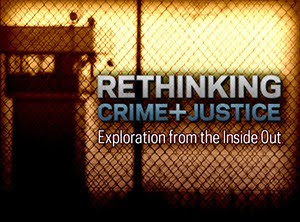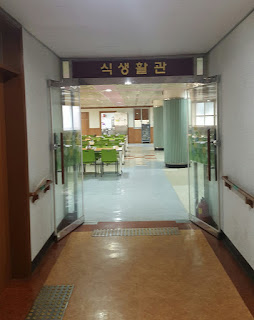My First 24 Hours in Prison

"They say, the first 24 hours behind bars are the hardest." - '12 Inside Student, Graduation Day
In the Fall of 2012 I spent every Tuesday night in Pennsylvania's State Correctional Institution in Graterford; it is a maximum security prison for men. Among the 14 selected Criminal Justice majors, I was the only Education major approved for the community-based-learning (CBL) course. I eagerly joined the fresh "outside" inductees, in the Inside-Out Prison Exchange Program. I am extremely honored to be an alumna of this program. The course will challenge your views and force you to consider what you have been taught as well as what you truly believe. From the moment I learned about the CBL course I was intrigued and wanted to know how I could be a part of the movement...The powerful movement of bringing people from the "outside" inside prisons to work with "inside" students to discuss prejudices, poverty, and perspectives. The idea of creating and discussing alternate methods to rehabilitation is inviting. The content and texts are carefully selected to reshape one's notions regarding how to respond to crime. It is too easy to say a teenager "broke the law"; assign the punishment that applies from a list of sentences. Any of us is capable (and have) violated a law (yes, you who has rolled through a 4-way stop or ran that red light). However, have we always been given a harsh consequence (i.e. ticket, points on or a suspended license)? Of course not. Think about some of the behaviors and actions you were/are guilty of as an adolescent (ages 10 to 19). Were you caught or found out for every act? Were you penalized for each action? If you are reading this, the answer is most likely, no.
Beyond those walls were my classmates, not "criminals", not "inmates", not "savages"...just men. Men who had made bad decisions, due to the (life) circumstances that were created without their consent or consideration. These human-beings were born into an abusive society, that was willing to sacrifice their well-being for others who were less deserving. The less deserving being those who have privilege, yet are unaware and uncaring for people who are "different". From childhood children of color have been taught that we are not different, but all humans. The differences that are highlighted throughout society and subliminally sold to the younger generations work to encourage separation and further divides across cultural, racial, gender, and religious (to name a few) lines. We do not have to fear what we do not understand or that which is different from what we have seen/been taught. Yet, several people do not use their individual ability to think critically to reject the notion of fear toward the unknown. Many people around the globe residing in impoverished communities, were/are forced into decisions that are labeled "illegal" or "morally wrong". If one feels the pressure, the stress and strain to feed, support or protect their family to which lengths will one go???
At our last class meeting, I recall stating that as an educator I would do my best to ensure that my (specifically) underprivileged students would be granted educational opportunities inside my classroom. I have not always kept my word. Since the fall of 2013 I have been teaching students diagnosed with Emotional Disturbance or Disorders. All of them have been arrested at some point; a great number of my students have served time in juvenile detention centers. When I have been granted the opportunity of learning about their experiences inside these youth prisons, I have been appalled to learn of the physical and severe punishments my children have endured, because they were not cooperative one day. Through working with this population of students who lack emotional intelligence - because the adults (NOT SOLELY THEIR PARENTS) in their lives have failed to teach them how to verbally express their frustrations - I learned more about the disconnection between adult and child brains.
For example, as an adult I have "bad days" or moments when I am vexed. My dad taught me to take a moment and process why I feel they way I do and identify the cause. Often times my feelings were hurt due to someone else's words or actions. I learned that I can respond differently and choose not to dwell on behavior that is upsetting to me. By the time I was in high school I could talk with adults in a mature manner that was acceptable. So now, when one of my students is upset, I know to let them take a moment to feel those emotions and discuss them later. If I want a student to comply with a request when they are emotionally flooded, I am the one in the wrong. Adults seem to forget that we can take a "break" or for the moment compartmentalize to focus on the job that needs to be completed, but as authority figures over young people we expect them to respond like us OR there will be a harsh consequence. The disconnect is enough to create greater divides between youth - especially young people of color - and adults.
If authority figures in the moment understood that a "non-compliant" student is having a difficult time processing their emotions and finding positive outlets to release anger, fear, hurt, etc. I believe we would have different consequences and not "add fuel to the fire". My job as an educator is to deescalate conflict. I wonder if more of the adults in my students' lives were involved in a program such as IOPE if they would be motivated to talk with young people and understand their reasoning for certain actions and behaviors. I wonder if we would not have overpopulated prisons and morally bankrupt businessmen profiting from the suffering of the less fortunate. In order for an individual to seek different paths in life, new opportunities must arise. IOPE is one of the opportunities for everyone to discuss and plan real ways to generate positive change. Above all, we must never forget that we are all people, human-beings. No one chose to be born into their family, socio-economic status, or "race". The Golden Rule should apply in all circumstances. Approach people with the same love and understanding you want for yourself and your loved ones. We need more humans behaving humanely.
Listen to the lyrics of Jay Z and R. Kelly 's The Streets to fully understand the dilemmas several people in poverty face.
At our last class meeting, I recall stating that as an educator I would do my best to ensure that my (specifically) underprivileged students would be granted educational opportunities inside my classroom. I have not always kept my word. Since the fall of 2013 I have been teaching students diagnosed with Emotional Disturbance or Disorders. All of them have been arrested at some point; a great number of my students have served time in juvenile detention centers. When I have been granted the opportunity of learning about their experiences inside these youth prisons, I have been appalled to learn of the physical and severe punishments my children have endured, because they were not cooperative one day. Through working with this population of students who lack emotional intelligence - because the adults (NOT SOLELY THEIR PARENTS) in their lives have failed to teach them how to verbally express their frustrations - I learned more about the disconnection between adult and child brains.
For example, as an adult I have "bad days" or moments when I am vexed. My dad taught me to take a moment and process why I feel they way I do and identify the cause. Often times my feelings were hurt due to someone else's words or actions. I learned that I can respond differently and choose not to dwell on behavior that is upsetting to me. By the time I was in high school I could talk with adults in a mature manner that was acceptable. So now, when one of my students is upset, I know to let them take a moment to feel those emotions and discuss them later. If I want a student to comply with a request when they are emotionally flooded, I am the one in the wrong. Adults seem to forget that we can take a "break" or for the moment compartmentalize to focus on the job that needs to be completed, but as authority figures over young people we expect them to respond like us OR there will be a harsh consequence. The disconnect is enough to create greater divides between youth - especially young people of color - and adults.
If authority figures in the moment understood that a "non-compliant" student is having a difficult time processing their emotions and finding positive outlets to release anger, fear, hurt, etc. I believe we would have different consequences and not "add fuel to the fire". My job as an educator is to deescalate conflict. I wonder if more of the adults in my students' lives were involved in a program such as IOPE if they would be motivated to talk with young people and understand their reasoning for certain actions and behaviors. I wonder if we would not have overpopulated prisons and morally bankrupt businessmen profiting from the suffering of the less fortunate. In order for an individual to seek different paths in life, new opportunities must arise. IOPE is one of the opportunities for everyone to discuss and plan real ways to generate positive change. Above all, we must never forget that we are all people, human-beings. No one chose to be born into their family, socio-economic status, or "race". The Golden Rule should apply in all circumstances. Approach people with the same love and understanding you want for yourself and your loved ones. We need more humans behaving humanely.

Comments